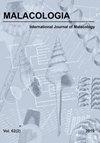The Correlation of Topographically-Derived Relative Wetness with Terrestrial Mollusk Presence and Abundance
IF 1
4区 生物学
Q4 ZOOLOGY
引用次数: 0
Abstract
ABSTRACT Many species of terrestrial mollusks are small and difficult to find, with poorly known ranges and habitat preferences. Because desiccation is a primary cause of mortality for many terrestrial mollusks, incorporating wetness as a habitat variable may improve survey results for different species. We compared presence and abundance data from terrestrial mollusk surveys in Tillamook Resource Area to two measures of relative wetness: topographic wetness index (TWI) and geomorphic features (landslides, debris-flow channels, etc.). Hurdle Model regression revealed a positive correlation between increased TWI and likelihood of presence or abundance for four species, and a negative correlation for six species. Overall species diversity and total mollusk count were negatively correlated with increased TWI, but the effect size was small (p = 0.02, R2= -0.03). Our Kruskal-Wallis Analysis of Variance of TWI between species was significant (p < 0.001), indicating terrestrial mollusks occupy significantly different wetness regimes – but this relationship was driven entirely by the wetness specialization of Hemphillia glandulosa. Our chi-square analysis of topographic features found significant preferences of different species for different topographic types, which correlated loosely but not precisely to the preferences indicated by TWI. These results show that altering current terrestrial mollusk survey protocol to include geomorphic features, which are simpler and less time-intensive than calculating TWI, would increase detection likelihood of certain species, including Hemphillia glandulosa, a species protected under the Survey and Manage guidelines of the Northwest Forest Plan.地形相对湿度与陆生软体动物存在和丰度的相关性
摘要许多种类的陆生软体动物都很小,很难找到,它们的分布范围和栖息地偏好都不为人所知。由于干燥是许多陆生软体动物死亡的主要原因,将湿度作为栖息地变量可能会改善不同物种的调查结果。我们将蒂拉莫克资源区陆生软体动物调查的存在和丰度数据与两种相对湿度指标进行了比较:地形湿度指数(TWI)和地貌特征(滑坡、泥石流通道等)。跨栏模型回归显示,四个物种的TWI增加与存在或丰度的可能性呈正相关,6个物种呈负相关。总体物种多样性和软体动物总数与TWI的增加呈负相关,但影响大小较小(p=0.02,R2=-0.03)。我们对物种间TWI方差的Kruskal-Wallis分析具有显著性(p<0.001),这表明陆生软体动物占据着明显不同的湿润状态,但这种关系完全是由龟头大麻属的湿润特化所驱动的。我们对地形特征的卡方分析发现,不同物种对不同地形类型有显著的偏好,这与TWI指示的偏好松散但不精确地相关。这些结果表明,改变目前的陆生软体动物调查方案,将地貌特征包括在内,这比计算TWI更简单、耗时更少,将增加对某些物种的检测可能性,包括受西北森林计划调查和管理指南保护的大麻属。
本文章由计算机程序翻译,如有差异,请以英文原文为准。
求助全文
约1分钟内获得全文
求助全文
来源期刊

Malacologia
生物-动物学
CiteScore
2.00
自引率
0.00%
发文量
15
审稿时长
3 months
期刊介绍:
Malacologia publishes papers on all groups of the Mollusca. Malacologia specializes in publishing long papers and monographic treatments. Complete data are especially appreciated. Papers must be of interest to an international readership. Papers in systematics, ecology, population ecology, genetics, molecular genetics, evolution and phylogenetic treatments are especially welcomed. Also welcomed are letters to the editor involving papers published or issues of import to science of the day.
 求助内容:
求助内容: 应助结果提醒方式:
应助结果提醒方式:


